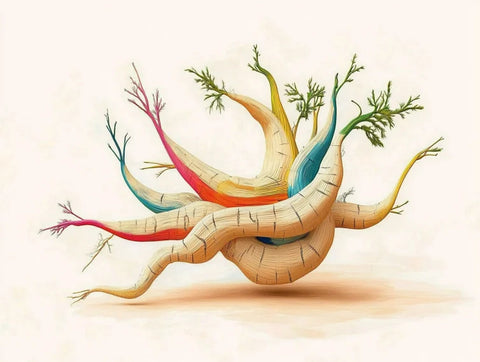Want to join the club?
He Huan Pi, also known as the bark of the mimosa tree (Albizia julibrissin or silk tree), has been a staple in traditional herbal medicine for centuries. Renowned for its calming and uplifting properties, it is often referred to as the "collective happiness bark" in Traditional Chinese Medicine (TCM). From reducing stress to supporting emotional balance, mimosa tree bark benefits are as versatile as they are profound.
What Is He Huan Pi?
He Huan Pi refers to the bark of the Albizia julibrissin, commonly known as the mimosa tree or silk tree. Native to Asia, the mimosa tree is known for its fragrant pink flowers and therapeutic bark. In TCM, He Huan Pi is prized for its ability to calm the mind, promote emotional well-being, and alleviate stress.
This herb is traditionally used to "lift the spirit," making it an ideal remedy for mood imbalances, restlessness, and tension. Modern research suggests that mimosa tree bark extract works by influencing serotonin levels much like conventional antidepressants.
Mimosa Tree Bark Benefits
1. Calms the Mind and Reduces Stress
He Huan Pi is best known for its calming effects on the mind and body. By promoting relaxation and reducing stress, it is often used to support emotional balance and mental clarity. This makes it especially useful for individuals dealing with anxiety, irritability, or mood swings.
Research suggests that compounds in the bark may regulate the nervous system, helping to ease tension without causing drowsiness. Its adaptogenic properties also make it effective for managing daily stress.
2. Promotes Restful Sleep
One of the key mimosa tree bark benefits is its ability to support restful sleep. He Huan Pi is often used to calm an overactive mind and promote relaxation before bedtime, making it easier to fall asleep and stay asleep.
Unlike conventional sleep aids, this natural remedy provides gentle support without leaving you groggy the next morning. Combined with other herbs, such as jujube or valerian, it can be even more effective in improving sleep quality.
3. Supports Emotional Well-Being
Referred to as the "happiness bark," He Huan Pi is traditionally used to uplift the spirit and alleviate sadness. In TCM, it is believed to clear "stagnant energy" that may contribute to emotional turmoil. Knowing this we made He Huan Pi central to our MOOD LIFT formula
This herb is particularly effective for those experiencing emotional tension due to stress or grief. Modern users often turn to albizia julibrissin silk tree bark for natural mood support, as it helps create a sense of calm and positivity.
4. Reduces Inflammation
He Huan Pi contains natural anti-inflammatory compounds that may support the body’s healing processes. Its ability to reduce swelling and soothe irritated tissues makes it beneficial for conditions such as arthritis, muscle aches, or skin irritation.
Some studies suggest that the bark’s anti-inflammatory effects may also play a role in supporting cardiovascular health by reducing inflammation in blood vessels.
5. Promotes Skin Health
The silk tree bark is often used in skincare for its antioxidant and anti-inflammatory properties. These properties help protect the skin from oxidative damage, promote collagen production, and reduce redness or irritation.
When used topically or included in skincare formulations, He Huan Pi can contribute to a more radiant and healthy complexion.
How to Use Mimosa Tree Bark
He Huan Pi is versatile and can be incorporated into your wellness routine in several ways:
1. Tea
Brewing a tea is one of the most common ways to enjoy He Huan Pi. Simply steep 1–2 teaspoons of dried mimosa tree bark in hot water for 10–15 minutes. This soothing beverage is ideal for promoting relaxation and calming the mind after a long day.
2. Tincture
A tincture made from albizia julibrissin bark provides a concentrated dose of its active compounds. Tinctures are convenient and fast-acting, making them a great option for managing stress or supporting emotional balance. One preliminary and in vitro study showed that ethanol and hydroalcoholic extracts of albizia julibrissin leaves exhibit significant anti-inflammatory activity.
3. Powder
He Huan Pi is available in powdered form, which can be added to smoothies, juices, or capsules for easy consumption. This is a good option for those who prefer a quick and versatile way to incorporate the herb into their daily routine. We recommend
4. Topical Applications
For skin health, He Huan Pi can be infused into oils or creams to create soothing topical products. These formulations can be used to reduce inflammation, redness, or irritation.
Albizia Julibrissin Benefits in Traditional and Modern Medicine
Traditional Uses in TCM
In Traditional Chinese Medicine, He Huan Pi is classified as an herb that nourishes the heart and calms the spirit. It is often used to address issues like:
- Insomnia caused by stress
- Emotional imbalances such as grief or sadness
- Physical tension or discomfort related to emotional stress
Modern Research
Modern studies on albizia julibrissin benefits have highlighted its potential for managing:
- Stress and anxiety through its adaptogenic effects
- Inflammation due to its natural anti-inflammatory compounds
- Oxidative damage thanks to its rich antioxidant content
These findings support its traditional use as a calming and uplifting herb while opening new doors for its application in skincare, cardiovascular health, and overall wellness.
Final Thoughts
He Huan Pi, or mimosa tree bark, is a powerful herb with a long history of use in Traditional Chinese Medicine. Its ability to calm the mind, promote emotional well-being, and support physical health makes it a valuable addition to any wellness routine.
Whether you’re brewing it into a tea, using a tincture, or incorporating it into your skincare, silk tree bark offers a natural and gentle way to enhance your overall well-being.
When selecting He Huan Pi products, look for high-quality, sustainably sourced options to ensure you’re getting the full range of albizia julibrissin benefits. With its versatility and therapeutic potential, this "happiness bark" has a lot to offer.



